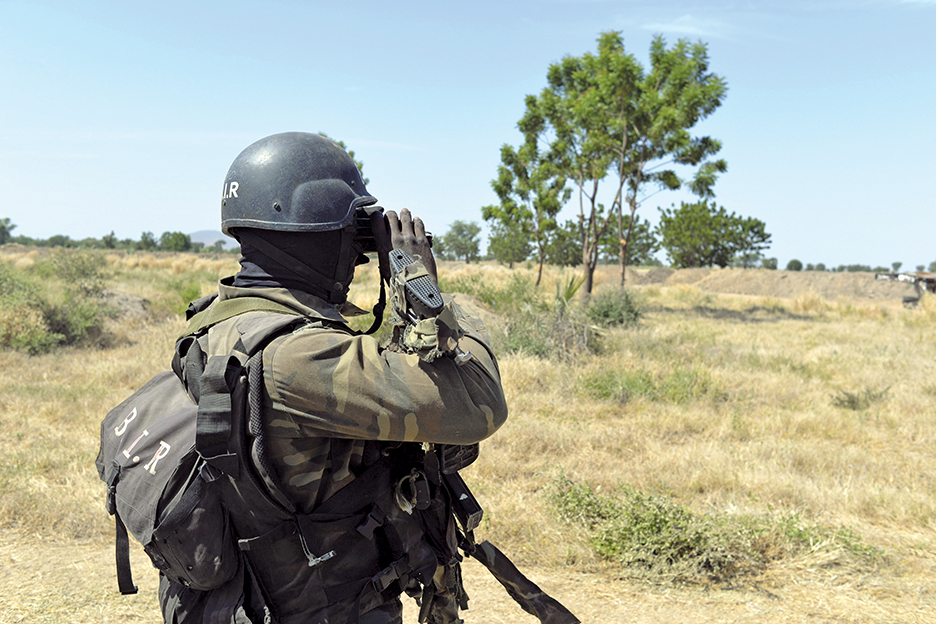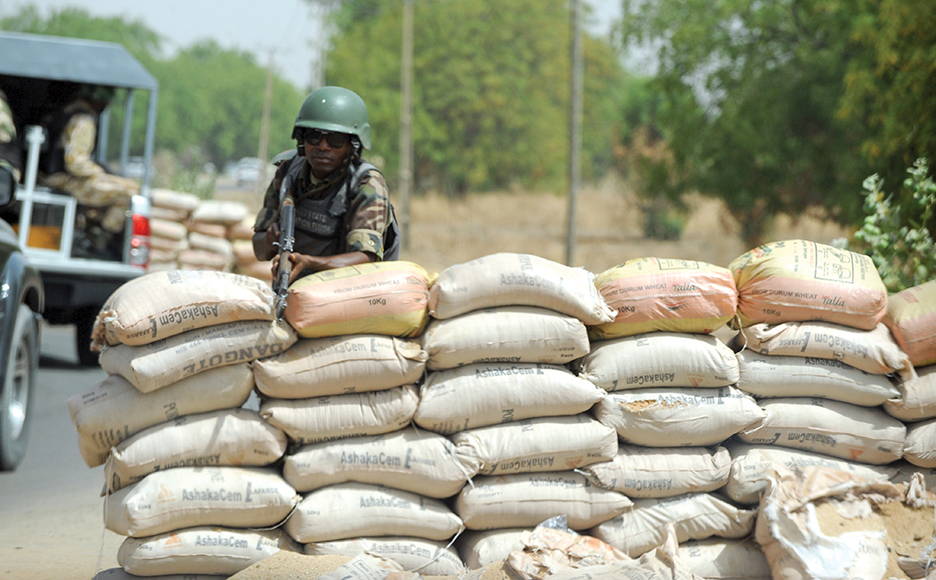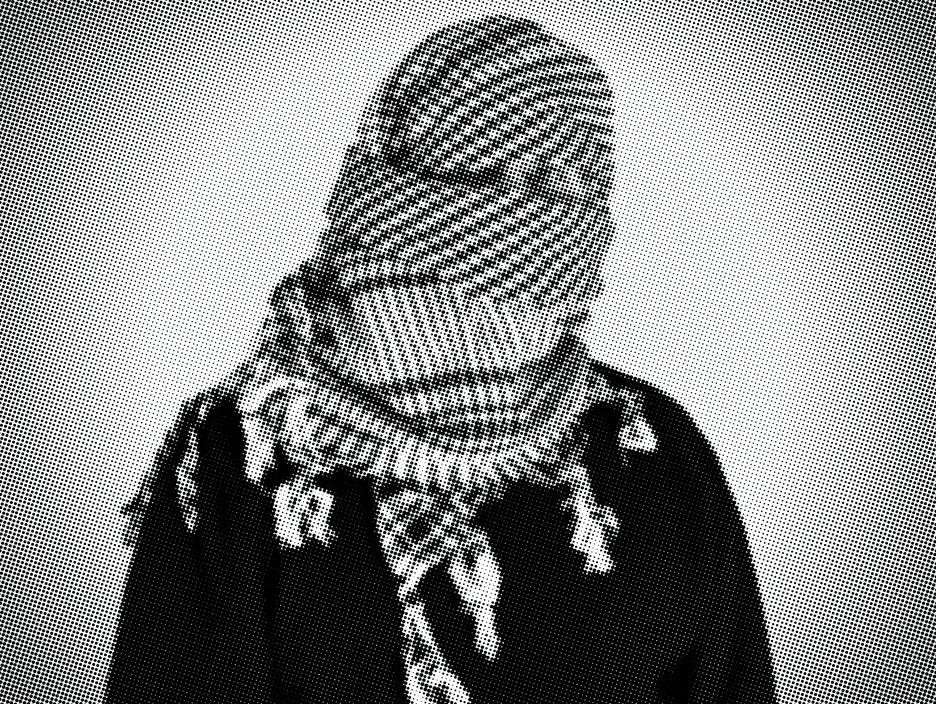Nigeria looks to stem the flow of weapons to Boko Haram.
In a blurry, 36-minute video shot somewhere in northeastern Nigeria, a man wearing a black cap and reading from a stack of papers stands beside a weapons cache.
“We are now showing the world all the arms and ammunition that we got from the Nigeria Army barracks,” said Boko Haram leader Abubakar Shekau, speaking first in Arabic and then in Hausa. “What we have in our armory now, plus all that we had before, is enough to execute a victorious war against the whole of Nigeria.”
Shekau went on to threaten more attacks like the one in January 2015 that leveled the town of Baga and left as many as 2,000 people dead. He said it was “just the tip of the iceberg,” according to a translation by the Nigerian newspaper Premium Times. Later in the video, another man wearing a caftan proudly toured Boko Haram’s arsenal. He gestured to mounds of bullets, AK-47s stacked like kindling, and boxes of ammunition and grenades piled shoulder-high.
“As you can see, we have thousands of AK-47 rifles. We have so much that we are still conveying them to our camp here,” the unidentified fighter said, boasting of anti-aircraft weapons, rocket-propelled grenades (RPGs) and a tank.

Among the many problems Nigerian security forces face is a feeling of being outgunned by Boko Haram fighters, who have the hardware of a professional army. In September 2014, for example, government Soldiers were stunned to find insurgents using a T-55 tank and an armored personnel carrier.
The questions remains: How do the insurgents get these sophisticated weapons and equipment?
Dr. Freedom Onuoha, a lecturer at Nigeria’s National Defence College and an expert on Boko Haram, said the group has acquired arms and military hardware in three ways: trafficking across international borders, stealing weapons and vehicles from defense installations, and buying weapons trafficked domestically.
International Trafficking
Nigeria’s border stretches across varied and rugged terrain that is difficult to patrol. More than 4,000 kilometers long, it crosses a desert in the north, the notorious outlaw hideout the Sambisa Forest in the northeast, and the marsh and islands of Lake Chad. Much of the eastern border with Cameroon is mountainous and foreboding. Traffickers use the difficult landscape to their advantage.
There are more than 1,500 illegal entry routes to the nation, compared to about 84 official entry routes, according to Nigeria’s Ministry of Interior. Most observers believe the actual number of illegal routes is much higher.
Onuoha, who speaks regularly to people in the customs service and military units stationed near the border, said they are daunted by the task of securing borders.

“The security agencies are finding it increasingly difficult to regulate the flow of arms,” Onuoha told ADF. “Essentially, the maritime borders are very porous, the land borders are very porous. Also in this environment, you have massive corruption as well as high unemployment and poverty. Once somebody gets hold of these weapons, it’s fairly easy to see who you can sell those arms to.”
Traffickers have found creative ways to sneak arms across the northeast border. One method is to attach thatched bags to camels or livestock brought across by nomadic herders. In the Lake Chad region, traffickers are using the canoes of small-scale fishermen to hide weapons. For larger shipments, traffickers sometimes use hiding places in long-haul trucks transporting legitimate goods.
John Pokoo, an expert in small arms and light weapons (SALW) and an instructor at the Kofi Annan International Peacekeeping Training Centre in Ghana, said it is common for well-known trucking companies to pass through border checkpoints with minimal inspection. “If I am coming as a well-established company and everyone knows me, typically in Africa I will not be subjected to the same search as an ordinary person,” he told ADF. “Already there are trucks that they empty out, workers cut a hole in the bed, load it with either cash or guns and seal it up. Then they load the normal goods in there on top. So unless you use a serious scanner, it is difficult to detect.”
Onuoha said anecdotal reports indicate that traffickers’ attempts to sneak weapons across official checkpoints slowed down near the end of 2014 and the beginning of 2015. This may be due to two factors: First, the weapons that had been looted in Libya after the fall of strongman Moammar Gadhafi are starting to run out. Second, Boko Haram had successfully taken control of some stretches of border territory, including the land near Baga, negating the need for formal crossings.
“The seizure of territory by Boko Haram and the ability to hold territory allows them to establish more long and enduring trafficking routes, which is even more difficult for the government to handle,” Onuoha said.
In February 2015, the Nigerian Army liberated Baga with assistance from regional forces.
A key to decreasing illicit cross-border activity will be tight cooperation between law enforcement agencies on all sides of the border. The Premium Times reported that a beefed-up intelligence-sharing agreement among Benin, Cameroon, Chad, Niger and Nigeria already is bearing fruit. In April 2014, Cameroonian forces arrested traffickers near the Chadian border. They were found to be carrying 288 rifles, 35 RPGs and 35 improvised explosive devices. The traffickers also had 50 Cameroonian passports.
Boko Haram, however, has proved adept at diversifying the routes by which it obtains weapons and changing once it attracts government attention. Origin points for arms that end up in Nigeria range from regional neighbors like Côte d’Ivoire and Liberia to Turkey and Eastern European countries, including Bulgaria, Kosovo and Ukraine. In 2011, officials found a shipload of arms and ammunition at a Nigerian port and arrested an Iranian arms trafficker.
Pokoo said security services are only one part of the equation to halting international trafficking. To truly reduce the flow of arms across borders, the central government will need to win the allegiance and trust of people living in border communities. “The state must work with people who live there and see what goes on on a daily basis,” he said. “Any military high-handedness may make it difficult for communities living along the border to cooperate.”
Pokoo is particularly concerned with increased ties between extremists in border communities and other ethnic groups in North Africa. This sort of alliance could give Boko Haram access to sympathetic communities stretching from southern Nigeria all the way to the Sahara. The International Crisis Group (ICG) said Boko Haram has developed significant links to extremist groups Ansar al-Dine, al-Qaida in the Islamic Maghreb (AQIM) and the Movement for Oneness and Jihad in West Africa (MUJAO). It also has established rear training bases in Niger.
“The three Islamist groups have boosted Boko Haram. In particular AQIM made its financial resources, military arsenals and training facilities available,” the ICG wrote in a 2014 report.
In 2015, Boko Haram pledged allegiance to the Islamic State.
Domestic Weapons
West Africa has become a hot spot for illegal SALW, with an estimated 8 million circulating in the region, according to the Economic Community of West African States (ECOWAS). As many as 70 percent of those are in Nigeria.
The methods used to conceal weapons moved within the nation are similar to those used to cross international borders. Arms smugglers linked to Boko Haram have hidden SALW in bags of grain and even wrapped them in plastic bags and stashed them inside empty fuel tankers, Onuoha said.
One unique aspect of internal trafficking is the use of tunnels to move weapons without detection. In July 2013, near the city of Maiduguri, Nigeria, authorities discovered a network of tunnels and bunkers used by Boko Haram fighters to move weapons between houses to avoid detection. Some of the bunkers were large enough to fit 100 people.
ECOWAS has launched a program that includes imprinting its logo, the serial number, manufacturer and other details on weapons in member countries. Official weapons will be marked with additional details. To control internal trafficking, Nigeria has begun a four-year action plan overseen by the Presidential Committee on Small Arms. Among its tasks will be identifying unregistered weapons-makers and instituting a nationwide program to mark and register weapons.
Most observers agree, however, that the proliferation of SALW in Nigeria is unlikely to decrease until people have a greater sense of security. Regular conflicts and a lack of ability by the police and military to provide safety in northern Nigeria have made it imperative for citizens to keep arms.
“This is a country that has lived in tension for more than 40 years,” Pokoo said. “How can you tell people under such conditions to just surrender their weapons? It’s virtually impossible.”
Weapons Depots
About 5 a.m. January 3, 2015, Boko Haram fighters stormed the military base in Baga, the headquarters of the Multinational Joint Task Force created to bring back peace to the troubled region. Militants entered on motorbikes and hurled homemade explosive devices. Although the Nigerian Soldiers fought back for several hours, they were eventually forced to flee.
The victory for Boko Haram gave it access to the huge weapons cache displayed in the video featuring Shekau. The theft of weapons from military and police installations has been a core element of Boko Haram’s armament strategy since the group’s inception. The group also has conducted strategic raids on locations where it can get ingredients for explosives.
Onuoha said better protection of military installations doesn’t necessarily mean more arms for Soldiers. Instead, he thinks strategic air support is badly needed to push back Boko Haram assaults and ensure that they are not able to regroup and continue to attack.
“The greatest problem, I think, that has allowed Boko Haram to take on so many territories — forget about the firepower — is the inability, in terms of the air power, of the Nigerian Air Force,” Onuoha said. “Some of the aircraft that you can use for surveillance, but more importantly for combat, are really not there in the inventory. The Air Force actually needs that kind of air power in the form of Cobra attack helicopters or other things they can use for immediate response … that could really be the game changer.”
There also is a need for better security of military weapons depots and registration of military weapons. Oversight and training of the Soldiers guarding depots are essential. Pokoo said a program in Ghana that trains military officers to register and mark their weapons has been successful at reducing the diversion of official weapons. Some of the most disturbing reports in Nigeria indicated that corrupt Soldiers have, in rare instances, intentionally left weapons depots unlocked so they could be raided by Boko Haram fighters.
“We know that Boko Haram is getting some of its supply from official armories,” Pokoo said. “The pickups, the armored cars, the heavy machine guns and all that. Some are coming from official armories. They’ve done that because they’ve been able to infiltrate the hierarchy of the military.”
Steps to cut off flow of weapons to boko haram
- Take back border territory controlled by Boko Haram.
- Employ air support for hitting Boko Haram camps and air surveillance to track trafficking activities.
- Enact strict oversight of border control officers to prevent bribery or collusion.
- Internally monitor arms circulating through weapons marking and registration.
- Set up cooperation on border patrols and intelligence sharing between nations.
- Train border agents to look for common methods of concealment.
- Have the government reach out to border communities.

